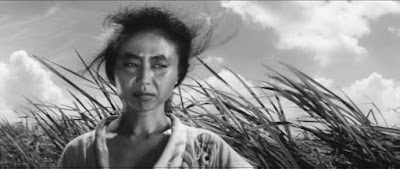This is the world of the story of the Onibaba, an expansion of an ancient Bhuddist cautionary fable about a mother trying to control her daughter by wearing a demonic disguise. Writer/director Kaneto Shindo starts well before that brief story and works to establish the mother and daughter (in law) and their rough subsistence life in the realm of the marsh.
Into this carefully balanced life, coursing across the river like a crocodile, comes Hachi, heading home from the war he's deserted but without his friend Kichi, son to the older woman and husband to the younger (neither woman is named). He explains the savage chaos of the war and how he and Kichi were both trying to escape but Kichi didn't make it. The older woman judges him but the younger cannot shake Hachi's charm.
A little wooing later and she's sneaking off at night for the first relief from her strained existence she's known for too long. Her mother in law twigs to this and approaches Hachi, even offering herself in the young woman's place. Hachi has, meanwhile, swapped his opportunistic lust for something more like love and wants to marry the younger (this doesn't play awkwardly on film and wouldn't here if the characters had been graced with names).
A little while later, something comes up and the mother in law comes upon the makings of a deterrent, a demonic mask, which she wears and appears as a terrifying spectre in the marshes, forcing her daughter in law to turn back in horror. This works until it doesn't: she can't take the mask off.
Kaneto Shindo was born and raised in Hiroshima. His military service ironically saved him from suffering the unimaginable hell of the atomic bomb. Not enough irony? Well, this old Hiroshiman died in 2012, making it to a month over a hundred years old. Whether it was a sense of the greatest luck in history or simply a life force energised by his own war experience, Shindo threw himself into the fashioning of fables for cinema, directing forty-eight of his own stories and writing two hundred and thirty-eight films for other directors. With masterpieces of the strange like Human, Ditch, Kuroneko up his sleeve, he easily joins the pantheon of post-occupation Japanese filmmaking. Onibaba is the central gem in his timeline.
Of that generation of Japanese filmmakers, there is barely an example within a ten year radius that does not mention, however metaphorically, the spectacle and effect of the bombs. In Onibaba this is in Hachi's description of the war in open country and in Kyoto itself, hub of civilisation rendered chaotic and desperate. There is also the spectre of a distant cloud of smoke as though a whole city was on fire. The setting is medieval but the solemnity of the witnesses to this is profound and clearly indicating recent history.
What leads to this moment is the world-building of the endless tall grass in constant motion in the wind and the naturalistic performances and dialogue of the players. These people really seem to live there. Shindo took his crew to the marshes at Chiba where they lived and worked for almost the whole production. Even knowing how difficult this process was and seeing the depiction of the hand-to-mouth inhabitants, I still want to live there.
None of this makes it into the source fable. This was Shindo's solid imagination that gave his public, weary of tradition and authority, a version based on life-affirming sex in place of the piety of the temple of the original. The cool jazz tones of the score that burst into thunderous taiko drumming for the night sequences would have felt like a bow to liberation from the generation of militarism the culture had endured. The nudity and convincing sex scenes work to this end; less titillating than candid. Like a number of films by this Methuselah of the medium, Onibaba is a blend of its times and timelessness and a testament to the need to climb from the pits of history into the kind of light useful for making a living. Few knew that better than Kaneto Shindo.
Viewing notes: I saw this on Criterion's stunning Blu-Ray but that, or the U.K. Eureka edition (also fine). Otherwise, it might be up to finding it second hand, locally. It's one of those essential films from history that are very difficult to get to see.

No comments:
Post a Comment